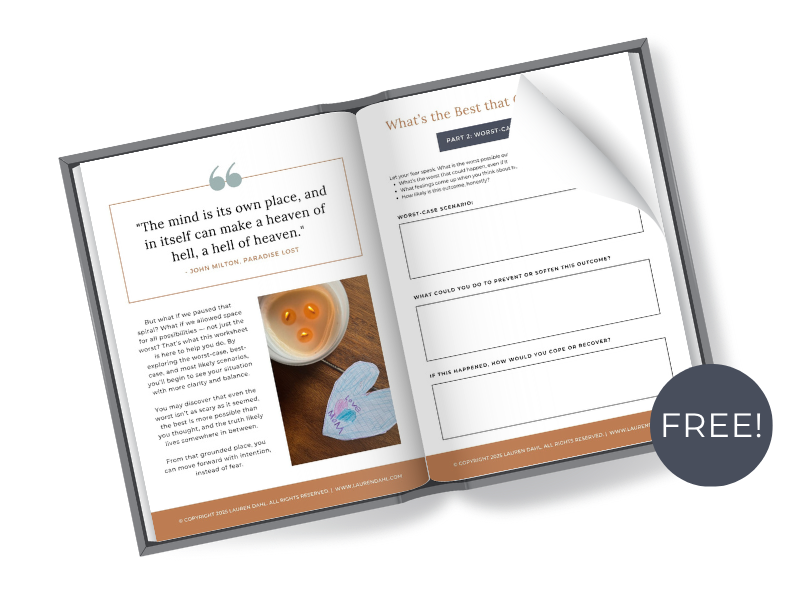Coach vs. Therapist: What's the Difference?
Jun 26, 2025
Ever wondered what makes a life coach different from a therapist? You’re not alone. It’s one of the most common questions I get from women who are trying to figure out what kind of support they really need.
And let’s be honest—since starting my journey to become a coach, I can’t tell you how many times I’ve heard some version of:
“Coaches aren’t qualified or licensed! They’re just trying to do therapy without the training!”
Fair enough. That concern isn’t coming from nowhere. But hear me out: coaching isn’t less than therapy. It’s just different—and often complementary. Coaches and therapists have distinct roles, and understanding those differences can help you choose the support that fits where you are right now.
Let’s break it down—without the clinical jargon or the combative soundbites.
Metaphor #1: The House
Think of yourself as a house. A real, lived-in, beautiful-but-worn home.
Sometimes that house needs serious repair work—the foundation is cracked, the roof leaks, and mold is growing behind the walls. In this case, you need a contractor who specializes in restoration and remediation.
That’s a therapist. Therapists help you go deep into past trauma, mental health challenges, and emotional wounds that need healing. Their role is to help get you to a solid, stable baseline of mental and emotional health.
Other times, your "house" is standing strong. You just want to love it more. You want to add art to the walls, update the lighting, plant a garden, or paint the front door a bold new color. You’re not fixing what’s broken—you’re enhancing what’s already there.
That’s where a coach comes in. I help you reimagine your “interior,” reconnect with your purpose, and build a life that feels more aligned, more joyful, and fully your own.
Metaphor #2: The Doctor vs. The Trainer
Here’s another way to think about it:
A therapist is like a medical doctor.
You see a doctor because something is hurting, not functioning properly, or getting worse over time. Whether it’s arthritis or a torn ACL, a doctor’s job is to treat the problem and help you heal. The goal? Get you back to baseline so you can function without pain or deterioration.
A coach is like a personal trainer.
You may be “healthy,” but you want more energy, strength, and clarity. You want to reach new goals, feel confident, and intentionally create the results you want in your life. You’re not in crisis—you’re ready for momentum.
See the difference? This isn’t about competition. Coaches and therapists aren’t rivals—they’re different resources for different needs.
Credentials & Regulation: What You Should Know
Let’s touch on the credentials piece—because as I mentioned, people have feelings about this. (Understandably.)
Therapists—including counselors, psychologists, and clinical social workers—are licensed mental health professionals. They’re required to earn advanced degrees (usually a Master’s or Doctorate), complete thousands of hours of supervised clinical practice, pass state exams, and adhere to strict legal and ethical guidelines. They’re trained to diagnose and treat mental health conditions like anxiety, depression, PTSD, and more.
Coaches, by contrast, are not regulated in the same way. Coaching is a self-regulated industry, which means that while some coaches go through rigorous training and certification, others may not. Reputable training programs—like those accredited by the International Coaching Federation (ICF)—do exist, and many coaches (myself included) pursue these to sharpen our skills and build trust with clients.
I hold the Certified Professional Life Coach designation from the ICF-accredited Certified Life Coach Institute. But if I’m being 100% honest? I pursued certification mainly for the street cred. The reason I’m able to help my clients create real change isn’t just a credential—it’s because I’ve been where they are. I’ve navigated divorce, reinvention, and the messy, magical middle of life. And I’ve created tools that actually work to get unstuck and move forward.
So, Do You Need a Therapist or a Coach?
Here’s the simplest way I can put it:
-
If you’re still working through trauma, grief, or a mental health diagnosis, start with a therapist.
-
If you’re functioning in daily life but feel stuck, uncertain, or uninspired—and you’re ready to move forward—coaching might be exactly what you need.
- If you have the time and resources to try both, then by all means, go for it!
If you’re saying things like…
-
“I just feel stuck.”
-
“I want to figure out what’s next.”
-
“I’m ready to stop surviving and start living.”
-
“I want to reinvent my life after divorce, but I don’t know where to start.”
...then you’re probably in a great place for coaching.
My Story: From Lost to Aligned
I’ll never forget the first time I hired a coach—it was 2008. I was 27, working in the career I had chosen as a teenager, and hated it. The office drained my will to live. I felt disconnected, irritable, and completely out of alignment.
I tried therapy. But honestly? My anxiety spiked before every session. Some weeks I had too much to talk about, and others I had nothing at all. I wasn’t dealing with trauma or depression—I just needed someone to help me sort through the fog and figure out what to do next.
That’s exactly what a good coach did for me.
I wasn’t depressed. I was despondent. (There’s a difference.)
I didn’t need to process the past—I needed to design a better future.
Where Coaching Fits In
Now, as a coach who’s lived through my fair share of plot twists, I help divorced women in midlife reconnect with themselves, rediscover what matters most, and design a second act that feels bold, meaningful, and completely aligned with who they really are.
We don’t dwell in the past.
We build the future.

DOWNLOAD MY FREE WORKBOOK
What's the Best That Can Happen?
After my divorce, I spent countless sleepless nights spiraling into worst-case scenarios: How will I take care of myself—let alone my kids? What if I never find love again? Have I ruined my kids' lives? What if this is it for me?
This free workbook shares how I shifted from fear to possibility—and how you can too. Enter your first name and email below, and I'll send it straight to your inbox.



